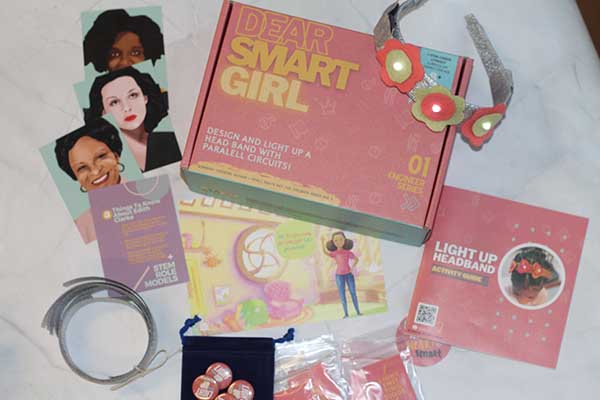 Olukeye, a technologist originally from Nigeria, is a mother of two daughters. Prior to becoming a startup founder, she was leading global digital transformations as a product manager for Ingersoll Rand. She had experienced the gender gap in STEM (science, technology, engineering and math) fields in her own professional journey and received additional perspective via her young daughters. As she searched for resources to broaden their exposure to STEM, she discovered a glaring scarcity, which inspired her to begin Smart Girls HQ.
Olukeye, a technologist originally from Nigeria, is a mother of two daughters. Prior to becoming a startup founder, she was leading global digital transformations as a product manager for Ingersoll Rand. She had experienced the gender gap in STEM (science, technology, engineering and math) fields in her own professional journey and received additional perspective via her young daughters. As she searched for resources to broaden their exposure to STEM, she discovered a glaring scarcity, which inspired her to begin Smart Girls HQ.
“Research has shown girls tend to lean away from considering STEM careers around age 12 for various reasons but most importantly because of the lack of consistent and positive engagement with those subjects early on,” said Olukeye who studied computer science and holds an MBA. “My daughters started expressing gendered preferences for toys and activities around age 3 or 4. I couldn’t believe they were already assimilating limiting messages around what boys and girls could or couldn’t do so early in their lives. I wanted to counter these messages by offering them plenty of exposure with STEM through informal means like activities, events, toys etc. I figured I’d be able to do a quick Google search for options, but the information either was all over the place or was unappealing to my girls. I became obsessed at reading all the existing research about girls, STEM and the drop off at age 12. It soon became clear to me that one big root cause is the lack of parent education and support, and I became passionate about developing a solution.”
Raising Smart Girls, an online community that offers insights, editorial content and guided activities for girls ages 6 to 12, is Olukeye’s answer to empower parents in piquing girls’ interest in STEM and sustaining it.
“There is so much focus on how important STEM will be for future career readiness, and there is a huge audience of parents that truly desires to offer their children opportunities to explore STEM careers but don’t know where to start or are overwhelmed by the choices available. Our newsletter, website and social media content has a combined reach of over 30,000 parents of girls looking for engaging and easy to execute informal STEM learning experiences for their daughters.”
Bringing faculty research expertise to the project
Olukeye’s vision is to evolve RaisingSmartGirls.com into a personalized learning platform that offers girls informal learning plans and experiences tailored to their interests. She discussed her concept at a Ventureprise alumni networking event with a Ph.D. student from the UNC Charlotte College of Computing and Informatics (CCI). He suggested contacting his professor Mary Lou Maher, chair of the CCI Department of Software and Information Systems. The rest, as they say, is history.
Maher, an expert in artificial intelligence (AI), has developed the algorithm that the team will build on to power the personalization feature to extend the Raising Smart Girls website into a web-based application. The algorithm, or recommender, will be able to create progressive learning sequences inspired by topics in which a girl expresses interest.
“For example, if you like animals, the application might recommend a set of experiences to guide you in exploring a career as a biologist,” said Maher. “The algorithm is designed to pique their interests and expand upon them by deepening the learning offered in the sequences as interest grows. It is based upon psychological models of curiosity.”
The database is not limited to activities. Experiences could include books, exhibitions, camps, workshops or other STEM-related offerings. Mayer said partnering with Olukeye has been an exciting experience.
“It is a fascinating application of my work, which is rooted in computational creativity,” said Maher. “As an applied AI researcher, I relish the opportunity to use AI to develop solutions to enhance human creativity.”
Continuing toward commercialization
During fall 2020, Olukeye and Maher participated in the NSF National I-Corps program that involved interviewing 100 potential customers. They received a $50,000 grant to assist with their discovery process.
“The National I-Corp program is highly selective and intense,” said Devin Collins, interim executive director of Ventureprise. “The NSF goal is to have 10% of site technology teams moving on to the National program, and Ventureprise has had 11 percent. Most university sites never reach the 10% goal.”
Olukeye and Maher spent time thinking about the value proposition of their proposed technology to determine their core market segments and potential revenue streams. The interviews also helped validate the customer need for a solution like the one they are proposing. As a result, they narrowed their potential target market to focus on parents, particularly mothers, who have the greatest influence in guiding their children’s interests.
“We initially intended to develop a learning platform that would be primarily distributed through schools to supplement STEM learning and extend classroom learning. However, we discovered there is no real bridge between school and home when it comes to informal learning,” said Olukeye. “Parents were already independently searching for solutions to help their kids; homeschooling families, who have full control of their child’s learning, were especially interested in the potential time-savings from our personalized learning plans.”
 Another gap the customer discovery process identified was the lack of hands-on learning activities designed especially for high engagement with girls. Olukeye, working with educational consultants and University interns, is developing 36 modules (kits) that will be included in the learning platform; paying subscribers to the platform will be able to choose to receive recommendations only or elect to include offline hands-on experiences.
Another gap the customer discovery process identified was the lack of hands-on learning activities designed especially for high engagement with girls. Olukeye, working with educational consultants and University interns, is developing 36 modules (kits) that will be included in the learning platform; paying subscribers to the platform will be able to choose to receive recommendations only or elect to include offline hands-on experiences.
“Our first kit is an electrical engineering activity in which girls build their own circuit to light up a headband,” Olukeye explained. “Rather than learning about circuits in an abstract manner, girls have an opportunity to do a real-world experiment that provides understanding of how to use electricity and how that can be extended in other ways. Our plan is to structure our models like a jungle gym; the recommender system will identify modules based upon an individual’s profile and interests. Then we will offer one of our kits as a good starting point for their exploration. The recommender can then build upon that first step on the ladder and let girls climb farther, and if they express new interests, the recommender will offer new choices.”
The kit launched last fall and is available for purchase on the Raising Smart Girls website.
“The feedback and excitement from parents have been so encouraging. I love getting pictures of girls proudly wearing their completed headbands. It shows that when we design with intention for girls, the learning outcomes and engagement that we desire will follow,” said Olukeye.
Currently, Olukeye and Maher are awaiting news of their application for a $250,000 U.S. Small Business Administration Small Business Innovation Research (SBIR) grant that will help them complete a working prototype of the application. The SBIR program is a highly competitive process that encourages domestic small businesses to explore the potential for technological innovation in their ventures.
Benefiting from additional University resources
Olukeye decided to rent space in UNC Charlotte’s PORTAL Building to better utilize the many resources that the University offers. PORTAL has more than 90,000 square feet of space dedicated to business innovation and partnerships.
Being on campus puts her in close proximity to her faculty research partner and has made it easier for Olukeye to hire interns through the University Career Center. She also utilized the Atkins Library Area 49 Makerspace and REPROS, located in the Popp Martin Student Union, in the creation of her first activity kit on electrical engineering. Being able to design a single prototype package quickly and cost-efficiently was a big benefit.
As part of her startup journey, Olukeye has consulted with the Small Business and Technology Development Center, which provides confidential, in-depth business counseling. She also is receiving advice from the Office of Research Commercialization and Development (ORCD).
Brad Fach, assistant director, ORCD, is working with Olukeye and Maher to protect the intellectual property that develops from their startup.
“Our office serves as the main point of contact at UNC Charlotte for both internal and external parties who have questions regarding patents and IP ownership and working with the University,” said Fach. “This is often a hot topic and something that is very important to entrepreneurs, and the University has developed an outstanding reputation in finding creative ways to work with external businesses and entrepreneurs who want to collaborate with or fund research at the University.”
On a per-research dollar basis, UNC Charlotte is ranked in the top 10 of all universities in the world in the number of patents obtained and the number of new spin-out companies launched each year.
“Our office is staffed with a patent attorney and a registered patent agent, and we can act as our own internal patent law firm, which is unique to universities and offers a tremendous value to our faculty, staff and students looking to patent their inventions,” said Fach. “We can often file an initial patent application for our researchers in 48 hours, where other universities would have to send it out for review and the process could take weeks.”